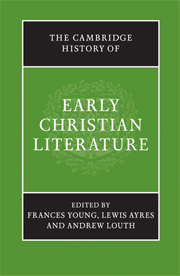Book contents
- Frontmatter
- PART ONE The Beginnings: The New Testament to Irenaeus
- PART TWO THE THIRD CENTURY
- PART THREE FOUNDATION OF A NEW CULTURE: FROM DIOCLETIAN TO CYRIL
- A LITERARY GUIDE
- B CONTEXT AND INTERPRETATION
- 37 Social and historical setting
- 38 Articulating identity
- 39 Christian teaching
- 40 Retrospect: interpretation and appropriation
- Bibliographies
- Index
- Map: The Roman Empire in the late fourth century AD"
- References
39 - Christian teaching
from B - CONTEXT AND INTERPRETATION
Published online by Cambridge University Press: 28 March 2008
- Frontmatter
- PART ONE The Beginnings: The New Testament to Irenaeus
- PART TWO THE THIRD CENTURY
- PART THREE FOUNDATION OF A NEW CULTURE: FROM DIOCLETIAN TO CYRIL
- A LITERARY GUIDE
- B CONTEXT AND INTERPRETATION
- 37 Social and historical setting
- 38 Articulating identity
- 39 Christian teaching
- 40 Retrospect: interpretation and appropriation
- Bibliographies
- Index
- Map: The Roman Empire in the late fourth century AD"
- References
Summary
It has been argued (chapter 9) that the early Church was school-like, and that the importance of dogma or doctrina (both words which simply mean ‘teaching’) has its roots in that characteristic. Ancient religion was not ‘dogmatic’, but philosophy was. It has also been evident (chapters 9 and 19) that Christian teachers played a significant role, often like Justin Martyr without having any official institutional position, or alongside the hierarchy and with shifting relationships with it, as in the case of Origen. Whether or not the bishop of Alexandria appointed Origen head of a Catechetical School, the account of his educational activities in Caesarea suggests the formation of a school of Christian higher education, alongside regular homiletic activity as a priest within the Church for the whole spectrum of believers. Control of such semi-independent teachers was far from achieved prior to the fourth century.
The post-Nicene period can be seen as a time of tightening up, of a determined effort to achieve uniformity, and so establish the doctrines which form Christianity’s dogmatic core, thus shifting the nuance of those ancient words for ‘teaching’. The tendencies that produced this had long been around: councils of bishops already had the custom of meeting to exclude teaching they found at variance with the Christian tradition, and so teaching authority was already in the process of being transferred from scholars to the episcopate, particularly acting collectively. A strong assertion of the unity of truth had long accompanied the apologetic attack on the many different options (haereses) offered by philosophers, and this would drive the thrust towards uniformity.
Keywords
- Type
- Chapter
- Information
- The Cambridge History of Early Christian Literature , pp. 464 - 484Publisher: Cambridge University PressPrint publication year: 2004
References
- 16
- Cited by

